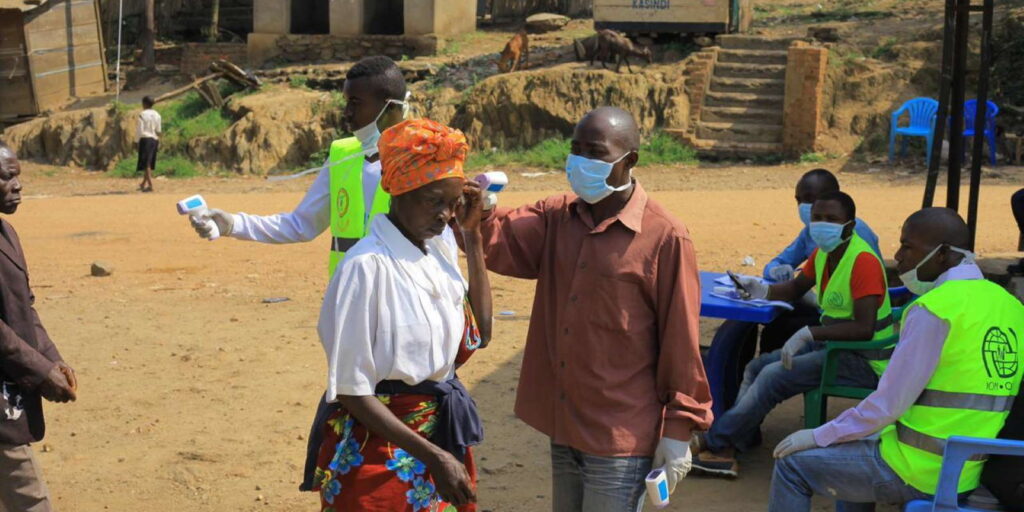Businesswoman Mary Malisi, a hotel owner from Malaba, regularly crosses the Kenya-Uganda border to purchase grain from Ugandan markets for her establishment back in Kenya. The border town of Malaba, which spans both sides of the Kenya-Uganda boundary, remains a lively hub, bustling with people from diverse cultures and nationalities.
Malaba serves as a critical one-stop border post, facilitating the clearance of over 2,000 trucks daily, making it the busiest transit route among East African nations. Additionally, the Malaba River on the Ugandan side marks another vital crossing point between the neighboring countries.
On August 14, the World Health Organization (WHO) declared a new strain of the mpox virus, known as Clade 1b, a global health emergency. This announcement has caused concern among frequent travelers like Malisi, especially after the first case of this new strain was recorded at the Malaba border.
The infected individual, a truck driver, traveled from the Democratic Republic of the Congo (DRC) – where the outbreak originated – through Uganda to the Kenyan coastal city of Mombasa before returning via the same route. Upon his arrival in Uganda, he fell ill but has since recovered.
Health authorities in Kenya and Uganda have heightened surveillance along their borders in response to the outbreak. Malisi, who frequently travels through these checkpoints, has observed the changes firsthand.
“We are now directed to handwashing stations upon arrival in both countries. When I return to Kenya, I have to undergo testing. Some travelers showing symptoms are taken for further examinations by health officials,” she shared with Al Jazeera.
Such health screenings are not new to the region, as similar measures were implemented during the COVID-19 pandemic. Malisi is familiar with the routine – temperature checks for fever and rapid tests – and she welcomes the precautions.
The Clade 1b variant of mpox has infected over 19,000 people, predominantly in the DRC, with cases also reported in neighboring countries such as Burundi, Rwanda, Uganda, and Kenya. These nations had not previously experienced mpox outbreaks.
Since last year, more than 500 people in the DRC have succumbed to the disease, according to health officials.
A Complex Health Crisis
The outbreak in the DRC in 2023 has posed significant challenges for healthcare workers. Doctors treating patients in the affected regions report that the Clade 1b mutation is spreading rapidly and is considerably more dangerous.
The first case of this new strain was traced back to the gold-mining town of Kamituga in South Kivu province, where artisanal miners from across the region, including Uganda, Rwanda, and Burundi, frequently cross borders using informal routes.
Mpox is transmitted through close contact, including skin-to-skin touch, sexual contact, and even through talking or breathing in close proximity to an infected person. The disease has been endemic in the DRC for decades, causing flu-like symptoms and pus-filled lesions, which can be lethal.
Dr. Pierre Olivier, who works for the medical aid organization Medair in North Kivu’s capital, Goma, has faced multiple health crises in the region, including Ebola, COVID-19, measles, and cholera.
“It’s a lot of crises for a country with limited resources,” Dr. Olivier told Al Jazeera. “We are not only battling the spread of the [mpox] disease but also the stigma associated with it, especially in South Kivu, where there’s a link to sexual contact. Some people are reluctant to seek medical help, opting for traditional remedies instead. By the time they reach us, treatment becomes more challenging.”
The situation in the DRC’s South and North Kivu provinces is further complicated by ongoing security challenges. The M23 rebel group, which re-emerged two years ago, continues to fight for control in eastern DRC, displacing millions and exacerbating the humanitarian crisis.
Concerns Over Vaccine Rollout and Spread
More than 10 African countries have now reported cases of mpox, with the DRC remaining the epicenter. Burundi has recorded the second-highest number of infections, with cases in 26 of its 49 districts.
Dr. Liliane Nkengurutse, director of Burundi’s public health emergency department, emphasized the need for greater awareness and training among healthcare workers to detect and manage the disease. “We are in the process of training community health workers who play a crucial role in detection and tracing the disease. We want our citizens to seek medical help at any health facility when they experience symptoms. The treatment is free,” she stated.
The WHO is expected to deploy the first batch of vaccines soon, but the timeline remains unclear. The rollout has been slow, and bureaucratic challenges have further delayed the process. Nigeria, which has reported 40 mpox cases, received 10,000 doses donated by the United States, making it the first African country to receive the vaccine.
Dr. Samoel Ashimosi Khamadi, director of virus research at the Kenya Medical Research Institute (KEMRI), expressed concerns over the lack of attention to the outbreak. “From our experience with COVID-19, we know that vaccines are crucial in preventing the spread of the virus. Given that the epicenter is in Central and West Africa, especially the DRC, we expected more focus there and a quicker rollout of doses,” he told Al Jazeera.
Experts warn that the virus is mutating faster than anticipated, often in areas lacking the necessary funding and equipment to monitor it effectively. There remain many unknowns about the virus, including its potency and transmission, complicating the response efforts.
Hans Kluge, WHO’s regional director for Europe, urged for a united global response: “We can and must tackle mpox together across regions and continents by putting systems in place to control and eliminate mpox globally, or we will enter another cycle of panic and neglect. How we respond now, and in the years to come, will prove a critical test for Europe and the world.



